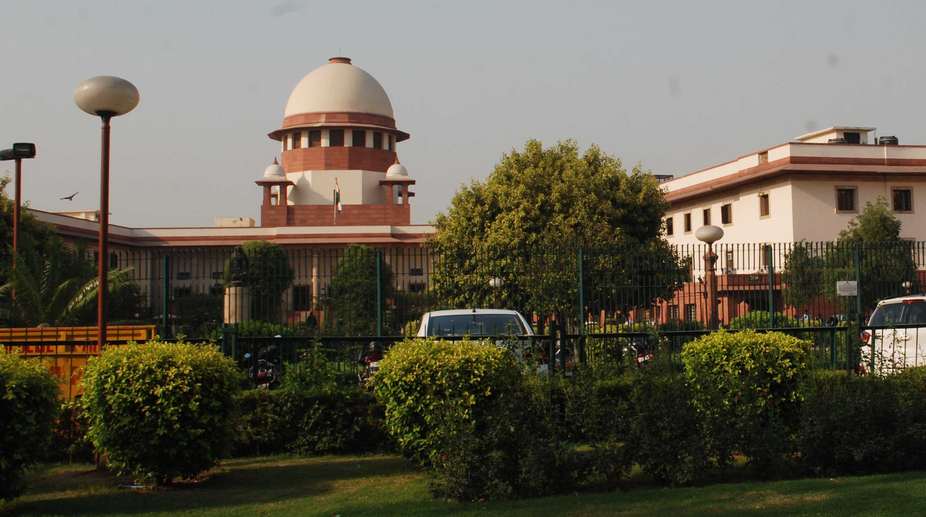‘Special 26’-style extortion bid lands duo in jail
Remember ‘Special 26’, the movie in which the protagonist cheats gullible people by impersonating as a CBI official.

Supreme Court (PHOTO: SNS)
The Supreme Court, while restoring the criminal conspiracy charge in the Babri Masjid demolition case against senior BJP leaders L.K. Advani, Murli Manohar Joshi and others, described it as a crime which "shook the secular fabric of the Constitution" 25 years ago and observed that the accused were not brought to book largely because of the conduct of the CBI and then Uttar Pradesh government.
Restoring the conspiracy charge, a bench of Justice Pinaki Chandra Ghose and Justice Rohinton Fali Nariman on Wednesday also transferred the trial from Rae Bareli to Lucknow.
Advertisement
Justice Nariman speaking for the bench said, "In the present case, crimes which shake the secular fabric of the Constitution of India have allegedly been committed almost 25 years ago".
Advertisement
It said that the accused persons could not be brought to book "largely because of the conduct of the CBI in not pursuing the prosecution of the aforesaid alleged offenders in a joint trial, and because of technical defects which were easily curable, but which were not cured by the State Government."
Restoring the conspiracy charge and transferring the trial, the judgment said, "What is being done by us today is only to remedy what was expected" to be done by the CBI and the then state government after the February 12, 2001 judgment of the Allahabad High Court.
Rejecting the contention by Advani and Joshi that the top court should not take recourse to Article 142 of the constitution for transferring trial from Rae Bareli to Lucknow as it would infringe on their fundamental rights under Article 14 and 21, the judgment said: "Almost 25 years have gone and yet we are solemnly reminded that Respondent Nos.4 and 5's (Advani and Joshi) fundamental rights should not be curtailed by any order passed under Article 142."
Transferring the trial on the conspiracy charge from Rae Bareli to a Lucknow court, the top court said the Sessions court will frame an additional charge under Section 120-B against Advani, Joshi, Uma Bharti (now Union Minister), Vinay Katiar, Sadhvi Ritambara, and Vishnu Hari Dalmia.
Two other accused Achraya Giriraj Kishore and Ashok Singhal have since passed away.
The top court directed that additional charges be framed under Section 120-B and the other provisions of the IPC as mentioned in the joint charge-sheet against Champat Rai Bansal, Satish Pradhan, Dharam Das, Mahant Nritya Gopal Das, Mahamadleshwar Jagdish Muni, Ram Bilas Vadanti, Vaikunth Lal Sharma Prem, and Satish Chandra Nagar.
Noting that Kalyan Singh, being Governor of Rajasthan, is "entitled to immunity under Article 361 of the Constitution as long as he remains Governor of Rajasthan", the court said that the Sessions court will "frame charges and move against him as soon as he ceases to be Governor".
The top court judgment said, "We are of the view that the best course in the present case would be to transfer the proceedings going on at Rae Bareli to the Court of Sessions at Lucknow so that a joint trial of all the offences mentioned in the joint charge sheet filed by the CBI against the persons named could proceed."
It further said, "In our view, since the charge of criminal conspiracy against all 21 accused is already in the joint charge sheet filed by the CBI at Lucknow, this charge could be added to the charges already framed against the survivors of the group of 8 accused."
Saying that there would be no de novo trial, the judgment said, "In our opinion, there is no need for a de novo trial inasmuch as the aforesaid charges against all 21 accused persons can conveniently be added under Section 216 of the Code of Criminal Procedure in the ongoing trial."
"No prejudice will be caused to the accused as they have the right to recall witnesses already examined either in Rae Bareli or in Lucknow for the purpose of cross-examination," the court said, setting to rest the apprehension that the transfer of trial at this stage would be detrimental to them.
Asking the trial court to complete the trial and deliver judgment within two years from the date of receipt of its judgment, the top court said that CBI "shall ensure that on every date fixed for evidence, some prosecution witnesses must remain present, so that for want of witnesses the matter be not adjourned".
It said the trial would proceed on day-to-day basis and there would be no adjournments.
It said the case shall not be adjourned on any ground except when the Sessions Court finds it "impossible to carry on the trial for that particular date". "In such an event, on grant of adjournment to the next day or a closely proximate date, reasons for the same shall be recorded in writing."
Noting that the judges presiding over the Special CBI court were being transferred in the past, the court ordered that "There shall be no transfer of the Judge conducting the trial until the entire trial concludes."
It permitted the parties before the trial court to approach the top court in the event of any of its "direction not being carried out, both in letter and in spirit".
The apex court verdict came on a CBI plea challenging May 2010 Allahabad High Court order upholding the dropping of conspiracy charge against Advani and others.
Advertisement